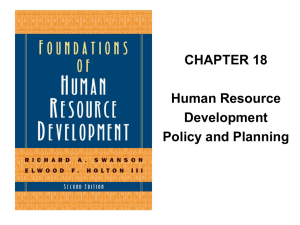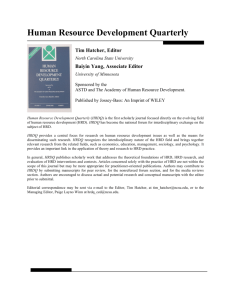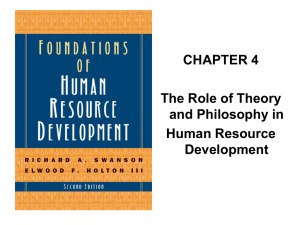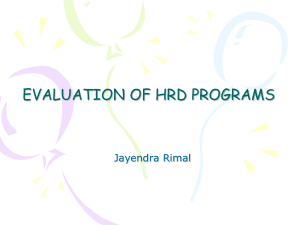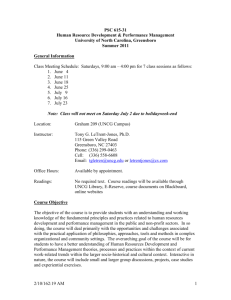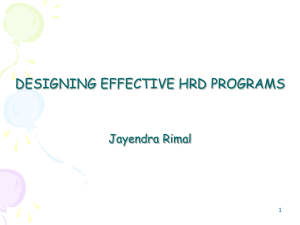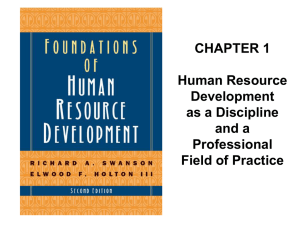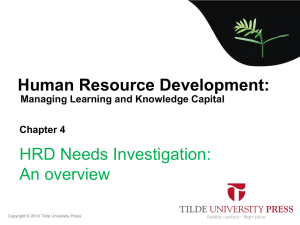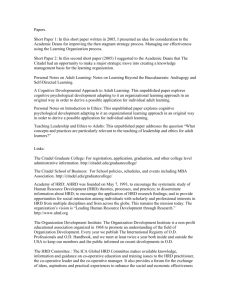Performance Consulting - The University of Texas at Tyler
advertisement
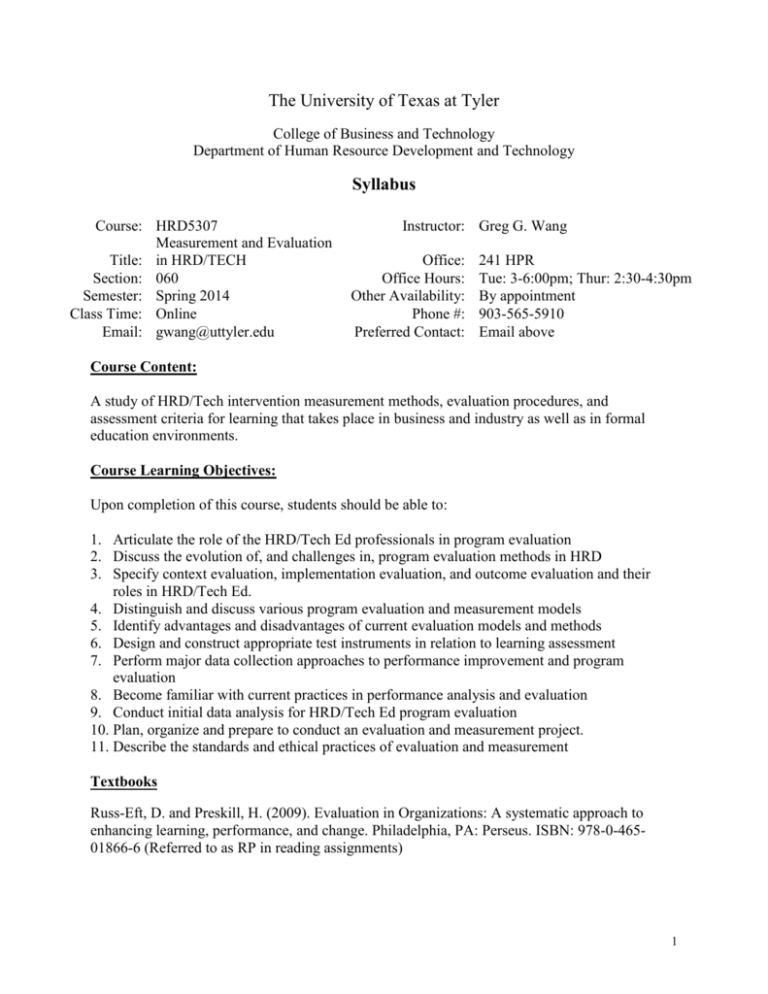
The University of Texas at Tyler College of Business and Technology Department of Human Resource Development and Technology Syllabus Course: HRD5307 Measurement and Evaluation Title: in HRD/TECH Section: 060 Semester: Spring 2014 Class Time: Online Email: gwang@uttyler.edu Instructor: Greg G. Wang Office: Office Hours: Other Availability: Phone #: Preferred Contact: 241 HPR Tue: 3-6:00pm; Thur: 2:30-4:30pm By appointment 903-565-5910 Email above Course Content: A study of HRD/Tech intervention measurement methods, evaluation procedures, and assessment criteria for learning that takes place in business and industry as well as in formal education environments. Course Learning Objectives: Upon completion of this course, students should be able to: 1. Articulate the role of the HRD/Tech Ed professionals in program evaluation 2. Discuss the evolution of, and challenges in, program evaluation methods in HRD 3. Specify context evaluation, implementation evaluation, and outcome evaluation and their roles in HRD/Tech Ed. 4. Distinguish and discuss various program evaluation and measurement models 5. Identify advantages and disadvantages of current evaluation models and methods 6. Design and construct appropriate test instruments in relation to learning assessment 7. Perform major data collection approaches to performance improvement and program evaluation 8. Become familiar with current practices in performance analysis and evaluation 9. Conduct initial data analysis for HRD/Tech Ed program evaluation 10. Plan, organize and prepare to conduct an evaluation and measurement project. 11. Describe the standards and ethical practices of evaluation and measurement Textbooks Russ-Eft, D. and Preskill, H. (2009). Evaluation in Organizations: A systematic approach to enhancing learning, performance, and change. Philadelphia, PA: Perseus. ISBN: 978-0-46501866-6 (Referred to as RP in reading assignments) 1 Wang, G. G. and Spitzer, D. (2005, Eds). Advances in HRD Measurement and Evaluation: Theory and Practice. [Special Issue] Advances in Developing Human Resources, Vol, 7, No. 1. Thousand Oaks, CA: Sage. (Referred to as WS in reading assignments) (The first textbook is available from the university bookstore. The second book is available at the UT Tyler online library) To locate the second textbook, go to http://library.uttyler.edu, click on Journal Search, and type in “Advances in developing human resources”. After click on enter, the journal title should appear. Click on the journal title, a login window will appear, then use your patriot ID and password combination from there, follow the year/vol number and look for the right issue number. You need to download all papers in that issue. Other related materials will be assigned online. Also see reference list below. Grading Policy and Criteria to Determine Final Course Grade: The course is organized as an adult learning experience. Students are expected to take responsibility for the learning, active participation of online discussion, and presenting information related to the learning subject. The following specific learning activities are designed as part of the curriculum. As a graduate course, students are expected to conduct research-based learning in addition to reading the required readings provided. Such effort should be reflected in your completed assignments and online discussions. Students will be assessed on the basis of the quantity, quality, and timeliness of their efforts. Assignment Grade 1 Article Critics 15 ROI Worksheet analysis 10 ROInet online participation report 20 Participation of Blackboard Discussion Forum (4 points for each module) 20 Final Project Paper 30 Online presentation 5 Total 100 Grading Scale 2 A B C D F 91 – 100 81 – 90 71 – 80 61—70 60 or below Date of Final Exam: This course will not have a close-book final examination. The equivalence of a final exam is your final project and a video clip of your presentation. The due date of your final project is May 4, 2014. Date to Withdraw without Penalty: Last day to withdraw the course is March 26 without penalty. Please check with the University Registrar’s office for any deadline changes and on applicable penalty after that date based on UT Tyler policy. Class Attendance and Make-up Policy As a class delivered through online format, you can study at your own pace and follow the semester time frame. Learning Schedule Module 1. Introduction (January 13—26) Readings: Russ-Eft and Preskill (RP): Chapters 1 and 3. Rest of readings are listed in the learning modules Online Discussion Due: January 26. Module 2. Models and Theories of Evaluation and Measurement (January 27-February 16) Readings: RP: Chapters 2 and 17. Online Discussion Due: February 16. Article Critique Due: February 16. Module 3 Evaluation Scope and Process (February 17—March 9) Readings: RP: Chapters 5 and 15. Online Discussion Due: March 15. ROI case analysis due: March 16 (You will have one extra week for both assignments thanks to the Spring Break) 3 Week of March 10. Spring Break (you may take advantage of this time and play catch-ups while we do not schedule for new learning content) Module 4 Data Collection and Analysis (March 17—April 13) Readings: RP: Chapters 6-13. Online Discussion Due: April 13. ROInet Participation Report Due: April 13 Module 5 Evaluation Reporting (April 14—May 4) Readings: RP: Chapters 4, and 14-16. Final Project Paper Due: May 4 Project Presentation due in video clips: May 4. ** Instructor reserves the right to revise the course outline and schedule. It is the student’s responsibility to locate the additional readings listed. Please take this as opportunities for literature search. All reference articles should be available online at UT Tyler library’s periodical locator unless indicated otherwise. To locate a journal on UT Tyler online library, go to http://library.uttyler.edu click on “Journals by Title”. Type in the journal title, e.g., Advances in Developing Human Resources, in the box and click on “search”. Once the journal link come up, click on it will bring up a page asking for your Patriot ID and password. Completing this step will take you to that journal website. You may chose year/volume/issue and download articles in PDF format. Academic Honesty Making references to the work of others strengthens your own work by granting you greater authority and by showing that you are part of a discussion located within an intellectual community. When you make references to the ideas of others, it is essential to provide proper attribution and citation. Failing to do so is considered academically dishonest, as is copying or paraphrasing someone else’s work. The consequences of such behavior will lead to consequences ranging from failure on an assignment to failure in the course to dismissal from the university. Because the disciplines of the Humanities value collaborative work, you will be encouraged to share ideas and to include the ideas of others in our papers. Please ask if you are in doubt about the use of a citation. Honest mistakes can always be corrected or prevented. 4 Requirements for All Assignments: All assignments, unless specified otherwise, must contain a cover page (do not forget to put your name on the cover page), and be double-spaced with page numbers, and margins of 1” on all sides, in either Arial or Times New Roman 12 font size. All references must be consistent with APA style. Disability Statement If you have a disability, including a learning disability, for which you request disability support services/accommodation(s), please contact Ida MacDonald in the Disability Support Services office so that the appropriate arrangements may be made. In accordance with federal law, a student requesting disability support services/accommodation(s) must provide appropriate documentation of his/her disability to the Disability Support Services counselor. For more information, call or visit the Student Services Center located in the University Center, Room 282. The telephone number is 566-7079 (TDD 565-5579). Additional information may also be obtained at the following UT Tyler Web address: http://www.uttyler.edu/disabilityservices. 5 Article Critiques Objectives This assignment is designed for students’ self-directed learning regarding the subject of performance analysis and evaluation. Among others, the objectives include 1. Conduct research oriented learning 2. Practice analytical and critical thinking Assignments You need to identify a published paper on the subject of HRD/Tech measurement and evaluation and following the requirement below. You may choose any article in the reading list for this course. You may also select articles outside the reading list as long as they are relevant to the topic of this course. (Note: Please do not use articles from general or commercial websites. It has to have a journal title and volume/issue and page numbers.) Requirements: 1. Begin the Critiques with a complete bibliographic citation in proper APA style [Author, (year of publication). Article title. Journal Title, volume(issue), page range]. 2. Briefly summarize why the article is important for students in HRD 5307. (e.g., How does it relate to M&E in HRD? Why is it important to enhance our understanding in M&E? How important is the article to the field of HRD?) 3. Summarize the article’s content: No more than 2 pages and use your own words to paraphrase. 4. Discuss the practical applications (if any) of the article for practitioners. What should they be able to do or to learn regarding M&E after reading the article? Be sure to critique the article, pointing out any weaknesses or any occasions when you think the author’s theory, model, process or ideas won’t work and explain why with literature support. Note that a major portion of your grade will depend on the quality of your critiques. 5. 6. The paper should be at least 6 double-spaced typed pages in length excluding cover page. 20 percent points will be deducted for late submissions (all critiques must be completed to receive a grade for the assignment). You are strongly encouraged to reference additional research or articles for a high quality paper. Be sure to cite your references in proper APA style. For details on APA style, see www.apastyle.org. 6 ROInet Forum Activities Requirements: The report should be 6 to 10 double-spaced typed pages in length 20 percent off for late submissions Background of ROInet ROInet (www.yahoogroups.com/group/roinet) is an Internet-based professional discussion forum focusing on HRD program evaluation and measurement. It was created by Dr. Greg Wang in 1999 to promote rigorous evaluation and measurement approaches and techniques. Over the years, it has attracted over 10,000 HRD professionals from over 40 countries to participating in the discussions. The forum currently has over 3,200 active members, mostly are HRD managers in multinational corporations. To complete this assignment, you will need to join the ROInet group via the above link in order to review past discussions and/or post new threads. In the past, you must have a Yahoo account to join this group. But in recent years, Yahoo seemed allow other email account, e.g., gmail, to join the groups. Assignment With the advancement in technologies, Internet learning and communications have become an important part of HRD professional life. This assignment is designed to encourage students in HRD 5307 to participate in virtual community of practice (CoP) and learn from field practitioners. To complete this assignment, you must-1. Initiate at least one discussion thread on a topic related to the learning content specific on HRD measurement and evaluation, and participate discussions thereafter. If you have difficulty to come up with an initial post, you may consider participating in discussions initiated by your peers. 2. Summarize the discussion thread you initiated or participated. The summary should be in a regular class paper format with subheadings and necessary structure. It cannot be simply a copy/paste of the discussion posts. You may quote your own post and the major points responded by others in your report if appropriate. Additionally, you may discuss and reflect on your observations and feelings about the online professional (or unprofessional) behaviors, as well as the internet as a virtual CoP. 3. The summary report should be no less than 6 double-spaced pages. 4. You may find it’s necessary to review the past discussions before posting your own thread of messages. You need to consider writing in a way that can generate some discussion with open-ended questions, not simply throw a list of questions at the group. 5. You may also need to learn about online etiquette for proper online communications. You are encouraged to be creative in your initial postings to the ROInet and the summary report. As a part of your initial post, you must start with a brief self-introduction prior to presenting your topic of discussion questions. 7 Important Issues to Remember: - In your post, please do NOT mention that you are a graduate student in an evaluation class at UT Tyler taught by Dr. Wang. Doing so may irritate some professional managers given their busy life and may cause misunderstandings by other group members. Since most of you are working professionals, you may mention your professional background or organizations related to the evaluation topic. This way you are likely to receive better responses or feedback from the ROInetters. - ROInet is a spam free professional forum. All postings to ROInet will be sent, by the system default, to the group owner Dr. Wang for review and approval. As such, inappropriate posts will be returned to the senders for revision or will be rejected. - Please avoid using unprofessional wordings and expressions, such as “u” for you, lol, OMG, etc. and spell out all words with correct grammars. - Please use open-ended questioning skill to generate maximum responses. - In order to generate sufficient responses to your post, you may wish to start thinking about your post early in the semester, post it much earlier than the assignment due date to allow the busy professional time to respond, and afford you the time to write the summary. Optional Minimum Requirement In case you have difficulties to come up with questions or topical ideas, you may review the archived postings and write a summary report focusing on a specific issue within the general topic of evaluation. You may also summarize the discussions initiated by your classmates. To identify appropriate issues from the past postings, you may use keyword search for any thread of your choice for the summary report. This is a minimum requirement for this assignment that should include the following: - Summary of the topic under discussion Your learning and critiques about the discussion Your observation and reflection of the online interactions among the professional members 8 Evaluation Project and Presentation Requirements: The paper should be at least 12 double-spaced pages in length with at least 10 references from related journals and books. You may form a two person team, but the expectations would be higher, e.g. minimum of 15 pages in length of the paper and more in-depth analysis. Objectives This assignment is intended to develop students’ hand-on experience in learning HRD/TECH program evaluation. Among other things, the objectives include 1. Gain in-depth knowledge on real world evaluation and measurement project 2. Apply models and methods covered in the course 3. Practice analytical and critical thinking Assignments Identify an HRD/TECH program in an organization and conduct a program evaluation and measurement project. You may conduct any levels of evaluation per Kirkpatrick’s taxonomy except for level one. In other words, no reaction level evaluation will be accepted. The evaluation report should at least include the following: 1. Describe a chosen training or HRD program and the organization background. (Answer the question of “what is happening?”) 2. Specify the evaluation question. (Answer the question of “what are you trying to do?”) 3. Discuss the evaluation method. (Answer the question of “What approach is used?”) 4. Explain the data collection process. (Answer the question of “where the data comes from?” and “how the data is collected?”) 5. Describe your analysis and the findings/results. (Answer the question of “how do you analyze the data and what have you found?) 6. Discuss recommendations to the program, if any, based on the evaluation results. (Answer the question of “So what?”) 7. Present your report and share your learning in the form of a video clip. You are encouraged to be creative in your evaluation report. However, you must include the above seven components in your final report. The following is a recommended structure for the report: a. b. c. d. Program Evaluation Report -- Content Outline Guide Title page Executive summary (200 words or less) Table of Content Brief background on the program (2 pages or less) Basic information about the organization and the program Purpose and/or rationale of the evaluation Stakeholders of the program Audiences of the program evaluation 9 e. Evaluation Design (2 pages or less) Evaluation questions Data collection methods and procedures Variables or measures of success Instruments for data collection Sampling procedures Data analysis procedures and statistics f. Results (3-5 pages) Description of sample Results of data analysis g. Discussions, Recommendations, and Implications h. Appendices if applicable Presentation: As part of the project, you will present your final project in the form of a video clip as if you present your project to your client. The length of the recorded presentation is to be 6-10 minute. Your presentation will constitute a part of your project performance. If your project is conducted by a two-person team, each member should take part in the presentation. You are free to choose presentation format, however, keep in mind that this is a formal business presentation, professional attire is required. (Note: If you have difficulty to submit your video clip to the Bb learning site, you may post it on YouTube side and submit a workable link to Bb submission link). 10 Students Rights and Responsibilities To know and understand the policies that affect your rights and responsibilities as a student at UT Tyler, please follow this link: http://www.uttyler.edu/wellness/StudentRightsandResponsibilities.html Grade Replacement/Forgiveness If you are repeating this course for a grade replacement, you must file an intent to receive grade forgiveness with the registrar by the 12th day of class. Failure to do so will result in both the original and repeated grade being used to calculate your overall grade point average. Undergraduates will receive grade forgiveness (grade replacement) for only three course repeats; graduates, for two course repeats during his/her career at UT Tyler. State-Mandated Course Drop Policy Texas law prohibits a student who began college for the first time in Fall 2007 or thereafter from dropping more than six courses during their entire undergraduate career. This includes courses dropped at another 2-year or 4-year Texas public college or university. For purposes of this rule, a dropped course is any course that is dropped after the 12th day of class (See Schedule of Classes for the specific date). Exceptions to the 6-drop rule may be found in the catalog. Petitions for exemptions must be submitted to the Registrar's Office and must be accompanied by documentation of the extenuating circumstance. Please contact the Registrar's Office if you have any questions. Disability Services In accordance with federal law, a student requesting accommodation must provide documentation of his/her disability to the Disability Support Services counselor. If you have a disability, including a learning disability, for which you request an accommodation, please contact Ida MacDonald in the Disability Support Services office in UC 282, or call (903) 5667079. Student Absence due to Religious Observance Students who anticipate being absent from class due to a religious observance are requested to inform the instructor of such absences by the second class meeting of the semester. Student Absence for University-Sponsored Events and Activities If you intend to be absent for a university-sponsored event or activity, you (or the event sponsor) must notify the instructor at least two weeks prior to the date of the planned absence. At that time the instructor will set a date and time when make-up assignments will be completed. Social Security and FERPA Statement: It is the policy of The University of Texas at Tyler to protect the confidential nature of social security numbers. The University has changed its computer programming so that all students have an identification number. The electronic transmission of grades (e.g., via e-mail) risks violation of the Family Educational Rights and Privacy Act; grades will not be transmitted electronically. 11 Emergency Exits and Evacuation: Everyone is required to exit the building when a fire alarm goes off. Follow your instructor’s directions regarding the appropriate exit. If you require assistance during an evacuation, inform your instructor in the first week of class. Do Not re-enter the building unless given permission by University Police, Fire department, or Fire Prevention Services. 12 About Your Instructor Dr. Greg Wang is professor of Human Resource Development at the College of Business and Technology, The University of Texas at Tyler. Over the past 20 years, Greg has been actively conducting performance improvement and human resource development research and practices, including corporate learning measurement, international HRD, performance improvement consulting, and HRD theory building research. A former HRD executive with GE Learning Solutions, General Electric Co. and Motorola University, Motorola, Inc., he worked as an expatriate Program Manager for Instructional Design with Motorola (China) and developed numerous performance improvement and learning programs. He also consults with companies, such as IBM, HP, Cigna, and Aramark, on elearning design, development, implementation strategies, and HRD measurement and evaluation. Among other things, Greg’s research interest is in HRD theory building, quantitative research methods, international HRD, and developing valid and reliable methods for and approaches to corporate learning measurement and return on investment (ROI) analysis of human capital. In 1999, he created the first Internet discussion forum ROInet (http://yahoogroups.com/group/ROInet) on corporate learning evaluation and measurement. The forum now has over 3000 subscribed professional members from 41 countries. Greg currently serves as the Editor of Journal of Chinese Human Resource Management (JCHRM). He also served as Assistant Editor and Quantitative Methods Editor for Human Resource Development Quarterly (HRDQ) in the past. Greg’s articles and research have been published or reported by Human Resource International (HRDI), Human Resource Development Quarterly (HRDQ), Human Resource Development Review (HRDR), Advances in Developing Human Resources (ADHR), Performance Improvement Quarterly (PIQ), Journal of European Industrial Training (JEIT), International Journal of Human Resources: Development and Management, (IJHRDM), Performance Improvement Journal (PIJ), The ASTD Performance and Training Yearbook, Workforce Management Magazine, Educational Technology, Chief Information Officer (CIO) Magazine, and National Public Radio (NPR). Greg also makes frequent presentations and speeches at national and international conferences and workshops on the subject of HR/HRD, learning measurement, and e-learning, including American Society for Training & Development (ASTD), International Society for Performance Improvement (ISPI), Academy of Human Resource Development (AHRD), HR Measurement Summit, and other international HR/HRD conferences in China, India, Korea, Russia, and United Kingdom, and the U.S. Greg is also serving as a guest professor of several universities in China. Greg is a board member of Academy of HRD (2008-2011). He also serves on editorial boards for other 4 national and international HRD journals. Greg’s educational background includes a Ph.D. in Human Resource Development and an MA in Management, both from The Pennsylvania State University. 13
